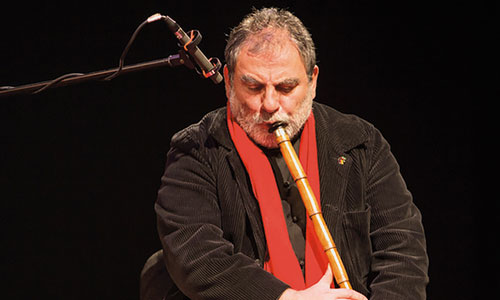Kudsi Erguner lives and works in Paris as musician (Ney-flute which is a reed flute) composer musicologist teacher author and translator.
He was born February 4 of1952 in Diyarbakir Turkey.Erguner comes from a family of Turkish musicians. His contact with many famous musicians from the older generation who continually passed through his parents’ house and his involvement with various Sufi-brotherhoods whose music and teachings Erguner studied left their decisive marks on him. He received his training directly from his father Ulvi Erguner who was the last great master of the ney.
In1969 he became a member of Istanbul Radio Orchestra. A few yeas later in1975 he moved to Paris to study in architecture and musicology.
Erguner carried out musical research in 1976 and collaborated on the filming on location in Afghanistan of Peter Brook’s movie Meetings with Remarkable Men.
In 1980 he made a research trip to Turkey commissioned by UNESCO. A year later he founded in Paris the Mevlana Institute for the study of the classical music and teachings of the Sufis.
During 1985-88 he created original compositions including work for Peter Brook’s Mahabharata (theater piece and film).
In 1986/87 he made an expedition to Pakistan commissioned by Radio France and France Musique for the purpose of recording and documenting traditional music
The year 1988 saw the creation of the group Fasl (later the Kudsi Erguner Ensemble) with the goal of reviving the classical music repertoire of the 16th century Ottoman Empire. That same year he collaborated with Peter Gabriel on the soundtrack for Martin Scorsese’s The Last Temptation of Christ.
In1991 he composed original music for Neva a ballet by Carolyn Carlson performed at the Theatre de la Ville de Paris. He also provided original music in 1997 for the ballet Le Voyage Nocturne by Maurice Bejart performed at the Theatre des Champs-Elysees Paris
Kudsi Erguner’s Ottomania (1999) is alleged to be the first World Music project that integrates the classical music of the Ottoman Empire with Western jazz improvisations and rhythms. It documents the story of a remarkable musical encounter and is a logical continuation of Erguner’s eventful life.
“Unfortunately 99% of the fusion music that is produced today is simply badly pasted together collages. With Ottomania I have attempted to let a fusion really develop. It was therefore necessary for both sides to take a step towards each other. With Kudsi Erguner’s ensemble on one side and three great musicians from the international jazz scene – the German saxophonist Christof Lauer the French tuba and serpent player Michel Godard and the American drummer Mark Nauseef – on the other Ottomania has successfully taken this step.”
Kudsi Erguner has given concerts and played in major festivals throughout the world. He has researched the music of India Pakistan and Turkey grounded diverse music ensembles recorded numerous albums and has worked with such well known artists as Peter Gabriel (Passion Us) Maurice Bejart Peter Brook Georges Aperghis Didier Lockwood and Michel Portal.
In 2016, the Director-General of UNESCO, Irina Bokova, appointed Kudsi Ergüner, UNESCO Artist for Peace, at a ceremony held had the Congress Center in Istanbul (Turkey) following the opening ceremony of the 40th session of the World Heritage Committee.
Kudsi Ergüner was named in recognition of his efforts to promote the universal values of music, an essential instrument of dialogue between cultures, for his contribution to the protection of musical heritage, his support for the International Decade of the Rapprochement of Cultures (2013-2022) and his unwavering commitment to the ideals of the Organization.
During the ceremony, Director General Irina paid tribute to Mr. Ergüner’s efforts throughout his career to keep alive the musical heritage of his country. “Your life and work have been guided by a profound passion to bring the past to life, to share the wisdom and beauty of traditions, to pass their messages of peace and dialogue to current and future generations, to share the depth of Mevlevi Sufi music, building on Persian and Turkish traditions, mixing this with poetry, literature and living arts across the region,” she said.
Erguner has thus made authoritative contributions to World Music. He has documented and revived nearly forgotten musical traditions and brought them to the attention of the Western public securing them a place within Europe’s cultural inheritance.
Discography:
Meditation on the Ney (Phillips, 1978)
Whirling Dervishes from Turkey (1981)
Turkey: Art of the Ottoman Tanbur (1989)
The Mystic Flutes of Sufi: Preludes to Ceremonies of the Whirling Dervishes (1988)
Cérémonie des Derviches Kadiri (1989)
Fasl Hidjaz Houmayoun (1990)
Sufi Music of Turkey (CMP Records, 1990)
The Turkish Ney (Auvidis, 1990)
Gazel: Classical Sufi Music of the Ottoman Empire (1991)
Ottoman Classical Music (Al Sur, 1992)
Peshrev & Semai of Tanburi Djemil Bey (1994)
L’Orient de L’Occident: Flamenco & Ottoman Sufi Music (1995)
The Sacred Flute of the Whirling Dervishes (Al Sur, 1996)
Works of Kemani Tatyos Efendi (Traditional Crossroads, 1996)
Vocal Masterpieces of Kemani Tatyos Efendi (Traditional Crossroads, 1996)
Psalms of Yunus Emre (Al Sur, 1997)
Chemins (1997)
Music from the Arabian Nights (1999)
Ottomania (İmaj Müzik, 1999)
Islam Blues (ACT, 2001)
Nazım Hikmet – Şair Cenazesi (2002)
Gazing Point (2008)
Sufiyan (2011)
Tarab (Kalan, 2018)
La Mélancolie Royale (Seyir Muzik, 2019)


